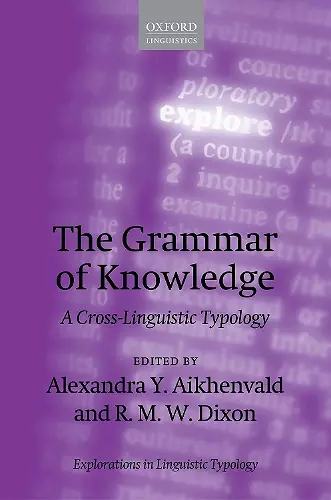The Grammar of Knowledge
A Cross-Linguistic Typology
Alexandra Y Aikhenvald editor R M W Dixon editor
Format:Paperback
Publisher:Oxford University Press
Published:3rd Mar '16
Currently unavailable, and unfortunately no date known when it will be back
This paperback is available in another edition too:
- Hardback£125.00(9780198701316)

The Grammar of Knowledge offers both a linguistic and anthropological perspective on the expression of information sources, as well as inferences, assumptions, probability and possibility, and gradations of doubt and beliefs in a range of languages. The book investigates twelve different languages, from families including Tibeto-Burman, Nakh-Dagestani, and Austronesian, all of which share the property of requiring the source of information to be specified in every sentence. In these languages, it may not be possible to say merely that 'the man went fishing'. Instead, the source of evidence for the statement must also be specified, usually through the use of evidential markers. For example, it may be necessary to indicate whether the speaker saw the man go fishing; has simply assumed that the man went fishing; or was told that he went fishing by a third party. Some languages, such as Hinuq and Tatar, distinguish between first-hand and non first-hand information sources; others, such as Ersu, mark three distinct types of information - directly required, inferred or assumed, and reported. Some require an even greater level of specification: Ashéninka Perené, from South America, has a specific marker to express suspicions or misgivings. Like others in the series, the book illustrates and examines these aspects of language in different cultural and linguistic settings. It will interest linguists of all persuasions as well as linguistically-minded anthropologists.
This outstanding collection of studies probes into one of the most critical areas of human cognition: knowledge. The systematic survey of 12 languages whose grammatical system includes epistemological devices reveals both fascinating differences and striking similarities in how different languages construe the nature of knowledge and its sources. * Edith Moravcsik, University of Wisconsin-Milwaukee *
ISBN: 9780198736707
Dimensions: 234mm x 157mm x 17mm
Weight: 482g
312 pages